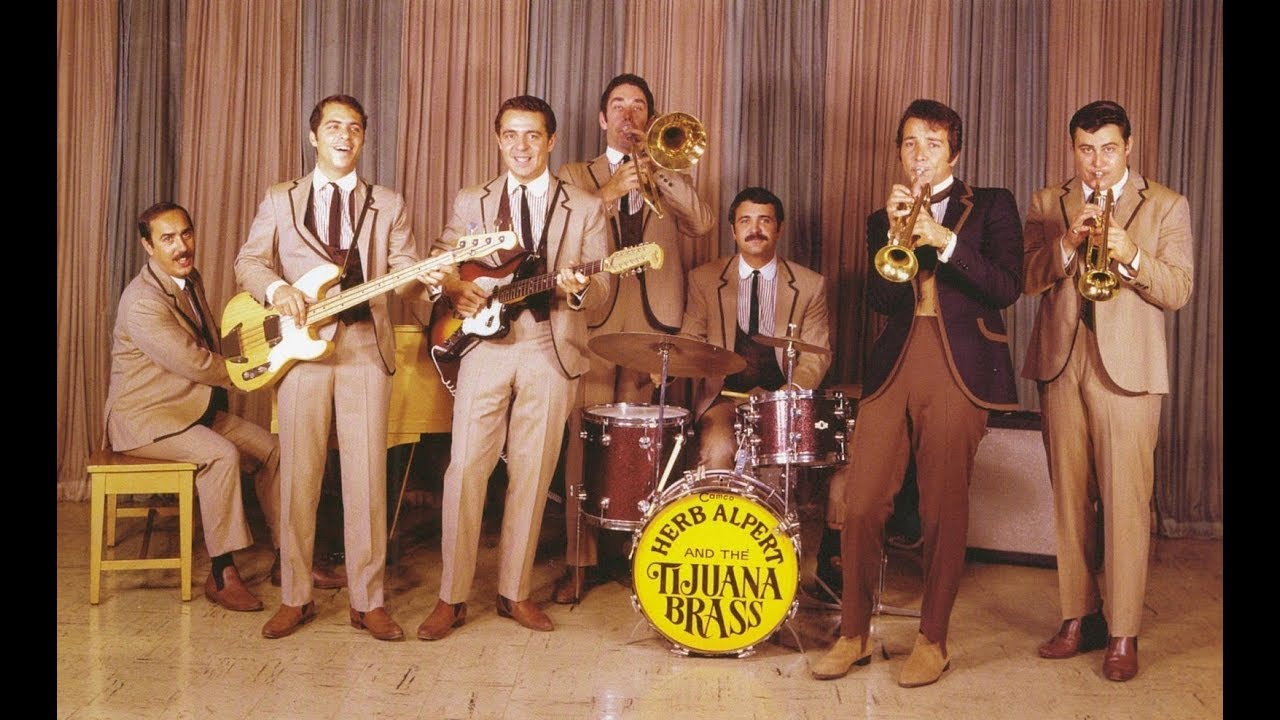Herb Alpert and the Tijuana Brass, often simply referred to as “Herb Alpert & the TJB,” was an American band led by trumpeter Herb Alpert that became one of the most popular and influential acts in the 1960s. Known for their distinctive “Ameriachi” sound—a blend of American pop, jazz, and Latin Mexican mariachi music—Herb Alpert and the Tijuana Brass created a unique genre that crossed over to mainstream audiences. The band achieved massive commercial success, influencing the development of instrumental pop music and the music industry at large.
Overview of Herb Alpert and the Tijuana Brass
- Formation and Early Years: Herb Alpert, born on March 31, 1935, in Los Angeles, California, began his career as a songwriter and producer before forming the Tijuana Brass. Inspired by a bullfight he attended in Tijuana, Mexico, Alpert experimented with a mariachi-style trumpet sound layered over modern pop arrangements. His initial recording, “The Lonely Bull” (1962), released under the name “Herb Alpert & the Tijuana Brass,” became a surprise hit, reaching No. 6 on the Billboard Hot 100 and giving birth to the group’s signature sound.
- Rise to Prominence and Distinctive Sound: The success of “The Lonely Bull” prompted Alpert to form an actual band, and Herb Alpert & the Tijuana Brass quickly rose to prominence with their lively and infectious blend of styles. Their albums, such as Whipped Cream & Other Delights (1965), Going Places (1965), and What Now My Love (1966), were massive hits, producing memorable tracks like “A Taste of Honey,” “Tijuana Taxi,” and “Spanish Flea.” The band’s sound featured bright, punchy brass, catchy melodies, and a laid-back, sunny vibe that captured the spirit of the 1960s.
- Massive Commercial Success and Cultural Impact: Herb Alpert & the Tijuana Brass became a pop culture phenomenon in the mid-1960s, with their albums dominating the charts. In 1966, they achieved the remarkable feat of having five albums in the Top 20 of the Billboard 200 simultaneously, a record that still stands. The album Whipped Cream & Other Delights became particularly iconic for its provocative cover and is still considered one of the best-selling albums of the 1960s. By the end of the decade, the Tijuana Brass had sold over 72 million records worldwide.
- Innovation and Expansion in the Music Industry: Beyond his work with the Tijuana Brass, Herb Alpert co-founded A&M Records with Jerry Moss in 1962. A&M Records became one of the most successful independent record labels in history, signing artists such as Carole King, The Carpenters, Cat Stevens, Joe Cocker, and The Police. Under Alpert’s leadership, the label was known for its artist-friendly approach and diverse roster, helping to shape the music industry and promote a wide range of musical styles.
- Later Years and Solo Career: As musical tastes shifted in the late 1960s and 1970s, Herb Alpert & the Tijuana Brass began to wind down their activity. However, Alpert continued to enjoy success as a solo artist, releasing the hit single “Rise” in 1979, which reached No. 1 on the Billboard Hot 100 and earned him a Grammy Award for Best Pop Instrumental Performance. He remained an influential figure in the music industry as a producer, executive, and philanthropist, and he has continued to release music and perform into the 21st century.
Herb Alpert and the Tijuana Brass greatest hits – PlayList:
Lonely Bull
Spanish Flea
Getting Sentimental over you
Love Potion 9
Never on Sunday
Mexican Shuffle
Taste of Honey
Tijuana Taxi
South of the Border
America
whipped Cream
Zorba the Greek
Impact on Music and Culture
- Pioneers of Instrumental Pop Music: Herb Alpert & the Tijuana Brass played a significant role in popularizing instrumental pop music. Their accessible, catchy melodies and upbeat arrangements helped bring instrumental music to mainstream audiences at a time when rock and vocal pop dominated the airwaves. Their success paved the way for other instrumental acts to achieve commercial success.
- Blending of Cultural and Musical Styles: The Tijuana Brass’s “Ameriachi” sound—combining elements of American pop, jazz, and Mexican mariachi music—was innovative and unique. Their music blurred the lines between genres and cultures, contributing to the growing diversity of popular music in the 1960s and influencing subsequent generations of artists.
- Impact on Album Sales and Marketing: The band’s album covers, particularly for Whipped Cream & Other Delights, became iconic and helped establish the idea of album artwork as an essential marketing tool in the music industry. The cover art became instantly recognizable and contributed to the album’s immense sales, showing how visual imagery could be used to enhance a musical product’s appeal.
- Contribution to the Record Industry with A&M Records: Herb Alpert’s role in founding and growing A&M Records cannot be overstated. The label’s success and artist-friendly policies helped to change the way record companies operated, emphasizing creative freedom and fostering long-term relationships with artists. This approach set a new standard in the music industry and contributed significantly to the careers of countless artists.
- Cultural Influence and Legacy: Herb Alpert & the Tijuana Brass’s music became a staple of 1960s pop culture, often featured in television shows, commercials, and movies, which kept their sound in the public consciousness. Their influence extends to jazz, pop, and world music, with artists and musicians drawing inspiration from their innovative fusion of styles. Alpert’s ongoing work in music, philanthropy, and visual art continues to reflect his deep impact on American culture.
Herb Alpert and the Tijuana Brass – BBC TV Special 1967
References
- Alpert, Herb. Herb Alpert: A Visual Biography. Thames & Hudson, 2020.
- Havers, Richard. Herb Alpert & the Tijuana Brass: An Album-by-Album Guide. Omnibus Press, 2001.
- Friedwald, Will. A Biographical Guide to the Great Jazz and Pop Singers. Pantheon, 2010.
- Ankeny, Jason. “Herb Alpert Biography.” AllMusic, 2020.
- Grammy Awards. “Herb Alpert: Lifetime Achievement Award.” Recording Academy, 2007.


Leave a Reply